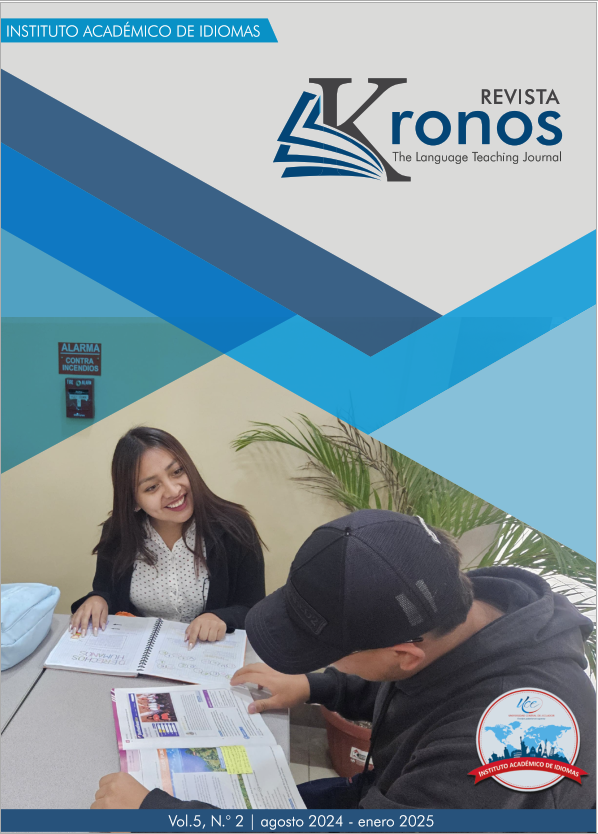Improving English Speaking Skills using the SmallTalk2Me Artificial Intelligence-Based Tool:
An Innovative Approach in Secondary Education
DOI:
https://doi.org/10.29166/kronos.v5i2.7668Keywords:
SmallTalk2Me, AI-based learning tools, English Speaking Skills, Pronunciation and Fluency, English Language LearningAbstract
Artificial Intelligence is covering all areas of science and English Language learning is not the exception. Therefore, this study examines how the AI-based tool SmallTalk2Me enhances English-speaking skills among A2-level secondary students in a private high school. Using an exploratory design, pre- and post-intervention assessments re vealed significant improvements in pronunciation and fluency, highlighting the tool's potential for fostering interactive learning environments. Furthermore, students displayed increased confidence and engagement in speaking activities, which fostered a more dynamic learning environment. Therefore, these results highlight the importance of SmallTal k2Me artificial intelligence-based tools in helping to improve speaking skills in a more interactive way.
Downloads
References
LIST OF REFERENCES
Ahmed, N., Brown, A., & Green, T. (2020). Artificial Intelligence in Language Learning: Applications and Innovations. Oxford University Press.
British Council. (2021). English in Ecuador: An analysis of the English language teaching and learning environment.
Brown, H. D. (2020). Principles of language learning and teaching (7th ed.). Pearson Education.
Brown, J., & Green, T. (2022). Interactive Technologies for Language Education: Enhancing Communication Skills. Cambridge University Press.
Creswell, J. W. (2014). Research design qualitative quantitative and mixed methods approaches (p. 398).
De la Vall, R. R. F., & Araya, F. G. (2023). Exploring the benefits and challenges of AI-language learning tools. International Journal of Social Sciences and Humanities Invention, 10(01), 7569-7576. DOI: https://doi.org/10.18535/ijsshi/v10i01.02
Fathi, J., Rahimi, M., & Derakhshan, A. (2024). Improving EFL learners’ speaking skills and willingness to communicate via artificial intelligence-mediated interactions. System, 121, 103254. DOI: https://doi.org/10.1016/j.system.2024.103254
Kim, S., & Zhang, Y. (2021). Modern Approaches to Language Learning with AI. Springer.
Lee, H., & Chen, X. (2023). Advancements in AI for Language Education: Theories and Practices. Palgrave Macmillan.
Manggiasih, L. A., Loreana, Y. R., Azizah, A., & Nurjati, N. (2023). Strengths and Limitations of SmallTalk2Me App in English Language Proficiency Evaluation. Tell: Teaching of English Language and Literature Journal, 11(2). DOI: https://doi.org/10.30651/tell.v11i2.19560
Miller, R. (2022). Effective Language Learning with Artificial Intelligence. Wiley.
SmallTalk2Me. (2024). SmallTalk2.Me. https://app.smalltalk2.me/reports/cqhdg25im8lahu4l7q5g
Smith, L., & Jones, M. (2022). Evaluating Speaking Skills: Methods and Criteria. Pearson Education.
Zou, B., Lyu, Q., Han, Y., Li, Z., & Zhang, W. (2023). Exploring students’ acceptance of an artificial intelligence speech evaluation program for EFL speaking practice: An application of the Integrated Model of Technology Acceptance. Computer Assisted Language Learning, 1-26. DOI: https://doi.org/10.1080/09588221.2023.2278608
Published
How to Cite
Issue
Section
License
Copyright (c) 2025 Camila Jiménez Iñiguez, Marcia Iliana Criollo Vargas

This work is licensed under a Creative Commons Attribution-NonCommercial-ShareAlike 4.0 International License.












